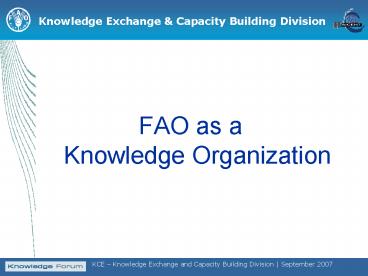Knowledge Exchange - PowerPoint PPT Presentation
1 / 12
Title:
Knowledge Exchange
Description:
Knowledge Exchange & Capacity Building Division. FAO as a. Knowledge Organization ... Online global consultations on avian influenza. Network of FAO Representatives ... – PowerPoint PPT presentation
Number of Views:34
Avg rating:3.0/5.0
Title: Knowledge Exchange
1
Knowledge Exchange Capacity Building Division
- FAO as a Knowledge Organization
2
Information Knowledge Management _at_ FAO
- The First Article of the FAO ConstitutionThe
Organization shall collect, analyse, interpret
and disseminate information relating to
nutrition, food and agriculture. - A specific objective of FAOs Strategic Framework
(Strategy E1) - A new focus on FAO as a Knowledge Organization
as part of the reform proposals approved by the
FAO Council
3
The FAO Web Site www.fao.org
- HTTP//WWW.FAO.ORG as a large knowledge-base
- Over 3 million web pages indexed in the corporate
search engine - More than 36,000 Documents (PDF and DOC)
- Around 100 major databases
- in all FAO Official Languages
- 90 Million hits (7 million 5 years ago)
- 3-4 Million Visits (323,000 visits 5 years ago)
4
FAO as a Knowledge Organization - Model
5
Knowledge management at FAO
- Continued enhancement of the World Agricultural
Information Centre (WAICENT) - www.fao.org receives over 3 million user visits
per month) - Increased access to FAOs Tacit Knowledge
- based on personal experience, lessons learned,
insight, etc. - Intensified knowledge sharing within the
organization and between FAO and its partners - Interdepartmental Working Groups
- Informal exchanges via discussion groups, blogs,
wikis - Further development of FAOs Knowledge Forum
(http//www.fao.org/KnowledgeForum/) - Thematic Knowledge Networks
- Best Practices
- Tools for Knowledge Exchange (e.g. Ask FAO)
6
Thematic Knowledge Networks
- Build virtual communities of professional staff
and collaborating Centres. Thus far FAO has - Conducted an Inventory staff technical skills
- Identified existing FAO thematic networks
- Performed Staff training in network management
- Examples of thematic knowledge networks
- Online consultation for food security experts
- Online global consultations on avian influenza
- Network of FAO Representatives
7
Best Practices
- Learn from FAOs experience - successes and
failures - Best practices provided in summary format
- divided by theme
- adopted successfully in more than one region
- interdisciplinary, reflecting complex nature of
problems - Input from FAO staff in HQ and decentralized
offices - Best practice examples by subject
- Networks in Disease Surveillance and Control
- Conservation Agriculture
- WTO Training
8
Knowledge Exchange Ask FAO
- Establish tools, standards and methods for
exchange of knowledge. - Resolution of underlying problem
- FAOs information services have been
supply-oriented - user needs do not always match
how information is made available or organized on
a website. - FAOs knowledge assets in the heads of
individuals (i.e. tacit knowledge) - Ask FAO access to FAOs tacit knowledge,
launched Dec 2005. - Two basic components Web-site and Question
Answer Service - Over 3500 questions answered in 20 months
- 24 of questions from Students, 11 from
Scientists, 9 from Agronomists, 3 from farmers - More emphasis on requests from developing
countries than general access to FAO web-site
9
KM Developments in 2007
- Establish a single Inter-Departmental Working
Group on Knowledge Management - Begin to focus on the needs of Members in
Knowledge Management, the establishment of TKNs
for Question and Answer Services and Best
Practices - An internal Workshop was held towards
establishing a Road Map for a Knowledge
Management Strategy
10
Future Challenges
- Overall Areas of Intervention
- Expand the ways in which information and data are
disseminated, using both explicit and tacit
knowledge to solve practical problems. - Learn from current experiences to scale-up
activities and to continue to innovate. - Build communities of practice.
- Embedding knowledge management in FAOs budgeting
and human resources processes.
11
Future Challenges
- Future activities in 2007 and 2008
- Corporate Knowledge Management Strategy for FAO
- Additional TKNs established / strengthened
- Staff skills in knowledge management further
developed - New collaborative tools investigated and deployed
- Knowledge management approaches included FAO work
in HQ and decentralized offices - More engagement with Knowledge Management
activities with Members - Advocacy and Awareness Raising (e.g. Web2forDev
Conference)
12
Feedback from the Consultation
- The Consultation may wish to support the
initiative of developing FAO as a Knowledge
Organization, and the activities currently under
way to achieve this. - The Consultation may also wish to encourage
Members to establish links between their own
knowledge-based services (e.g. question and
answer services, thematic knowledge networks, and
documentation of best practices) and the FAO
Knowledge Forum, and to adopt FAO approaches,
methodologies, and guidelines where appropriate.































